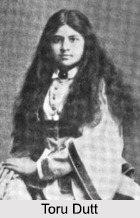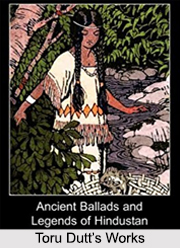 Toru Dutt was one of the greatest writers of English Literature who will be remembered for ages for the eternal charm in her works. She was a poet, novelist, and a translator. She died at a very young age of 21 years, she had left behind an immense collection of prose and poetry. Her works are skillfully crafted which reflect the experiences of a young mind and have an intrinsic power, which is the characteristic of good literature. She was well versed not only in English but also in French, German and Sanskrit.
Toru Dutt was one of the greatest writers of English Literature who will be remembered for ages for the eternal charm in her works. She was a poet, novelist, and a translator. She died at a very young age of 21 years, she had left behind an immense collection of prose and poetry. Her works are skillfully crafted which reflect the experiences of a young mind and have an intrinsic power, which is the characteristic of good literature. She was well versed not only in English but also in French, German and Sanskrit.
Early Life of Toru Dutt
Toru Dutt was born on 4th March 1856 in prosperous and cultured Hindu family of the Dattas of Rambagan, Kolkata. Toru hails from a well-educated family. She was the daughter of Gobinda Chandra Dutt and Kshetramoni. Her father was a linguist and a versifier and he gave the best possible English education to his children. Toru Dutt was the youngest of the three children. She had a brother named Abju and a sister named Aru. They were educated in France and England. They were not sent to school, but had private tutors to teach them English literature and western music. She continued her higher French Studies in England and she attended the Higher Lectures for Women at the University while living in Cambridge 1871-1873.
Both the sisters earned fame for their literary calibre. She lost her brother and sister in 1865. Her grandfather, Rasamay Dutt was a great lover of English literature who was known for his progressive views. He was the first Indian Commissioner of the Court of Small Causes and was one of the founders of the Hindu college. The famous administrator, writer and historian, Romesh Chunder Dutt was her cousin.
 Contribution and Works of Toru Dutt
Contribution and Works of Toru Dutt
Toru Dutt left behind an impressive collection of prose and poetry. Her novels, the unfinished "Bianca" or "The Young Spanish Maiden" written in English and "Le Journal de Mademoiselle d"Arvers", written in French, were based outside India with non-Indian protagonists. Her work "A Sheaf Gleaned in French Fields", a volume of French poems she had translated into English was published in 1876 without preface or introduction. At first this collection attracted little attention. Eight of the poems had been translated by her elder sister Aru.
She wrote poems such as "Sita", "Lotus", "Ancient Ballads" and "Legends of Hindustan", "Baugmaree", "France", "The Lotus", "The Tree of Life", and many more. Her poem, "Our Casuarina Tree", has become one of the popular poems in contemporary Indian literature. In this poem, she recalls about her happy childhood days through her memories of the tree, which she connects with her siblings. It is often taught in high schools in India as a part of the English program. She also translated some sonnets of Duchess de Cramont and regarded him as one of the best of modern French poets. Unpublished translations of his sonnets were found among her posthumous papers.
She was deeply interested in French history and politics, and published A Scene from Contemporary History of France. Her "Ancient Ballads" and "Legends of India" were the beginning of a new dawn in Indo-Anglican writing. She was a devout Christian and translated "The Blood of Jesus" into Bengali. She felt the first staggering blow of fate at nine when her only brother Abju died. The shock was tremendous and the two sisters, Toru and Aru, turned to literature for consolation, trying to drown their grief in the repeated readings of Milton`s "Paradise Lost". Within a few years her sister also died leaving her alone.
As a diligent reader of newspapers, Toru Dutt was aware of all the cases of injustice reported daily, and they filled her with bitterness against the British. There was the case of a person who was sentenced to three weeks of hard labour because he had defended himself when attacked by some dogs owned by an Englishman. Enraged, Toru wrote: "You see how cheap the life of an Indian is in the eyes of an English judge." She wrote to her friend about another case in which some soldiers had killed nine Bengalis, wounded seven and mentioned several other instances of brutality. She was against the extravagance of the people during the visit of the Prince of Wales, and critical of the grand fireworks displayed in his honour in Calcutta Maidan. When the Duke of Edinburgh came to India in 1869, she questioned, "Was it not literally converting money to smoke?" remembering how £ 9000 was spent on fireworks. She disapproved pomp, extravagance, and waste.
Critics describe her as the "fragile blossom" that withered so fast. The well-known poet and novelist Andre Theuriet showered much praise on her. Her last poem "A Mon Pere" is praised worldwide and is considered "faultless". She was in a hurry to put in as much work as possible, to project and interpret India`s past and glorious tradition to the English-speaking world. Though English by education, she was an Indian entirely. E.J. Thompson wrote about her, "Toru Dutt remains as one of the most astonishing woman that ever lived fiery and unconquerable of soul. These poems are sufficient to place Toru Dutt in the small class of women who have written English verse that can stand".
Death of Toru Dutt
Toru Dutt had the same disease that had taken her brother and sister and she knew that she had to yield to pitiless tyrant. Though she died at a very young age, she had left a deep mark in English literature. She died in Kolkata on August 30, 1877. She is called the "Keats" of Indo-English literature as she died at a very young age of consumption like him and for both of them, the end came slow and sad.



















